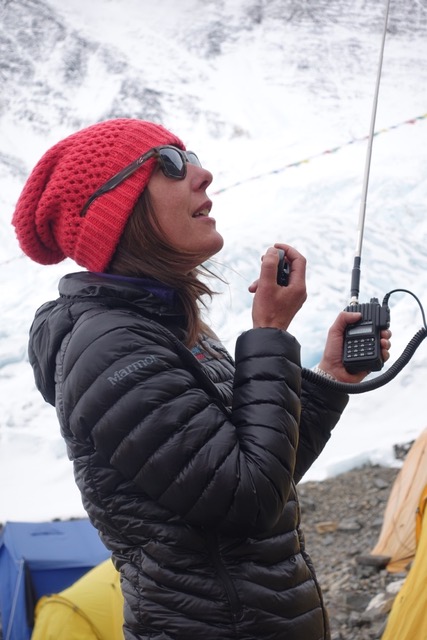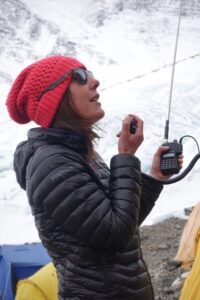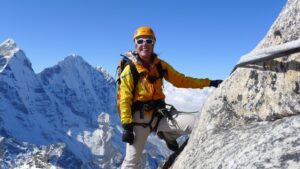Staff Highlight: Dr. Monica Piris


At Alpenglow Expeditions, we feel incredibly lucky to have Dr. Monica Piris as our on-call high-altitude expedition doctor. More so than any particular climb or summit, Alpenglow maintains health, safety, and returning home as the most important part of any expedition. While all of our guides are trained as Wilderness First Responders at minimum, we have found it incredibly useful to have a mountain medicine specialist on deck for all our expeditions.
Dr. Piris has been on more than 15 expeditions to some of the world’s highest peaks, including Everest, Lhotse, Cho Oyu, and Manaslu. Her work has ranged from monitoring team members’ health throughout the expedition, treating locals and visitors for common illnesses, to treating frostbite and potentially fatal altitude-related illnesses and offering diagnostic and therapeutic advice over the radio for unwell climbers being rescued above 8,000m.
Did you grow up recreating in the mountains?
No, not at all! We took the very occasional hike during the summer holidays as a child. Until my 20s, I didn’t have even a concept of rock climbing or mountaineering, as I’d never really been exposed to it. I really began spending a lot of time in the mountains when I lived in New Zealand for a couple of years. First, I did a lot of hiking on their superb trails using their fabulous hut system, and then I progressed to learning basic rock climbing and winter mountaineering skills over the two years I was there. After that, mountains became a part of my daily existence and ultimately shaped the big life decisions that I made thereafter.
What motivated your decision to turn toward mountain medicine?
By the early 2000s, I was spending more time in the mountains than I was practicing medicine. I think it was my Dad—perhaps he was worried about my professional future—who saw that there is such a thing as a diploma in Mountain Medicine. He suggested that I look into it, and it made sense for me to try and combine my medical knowledge with mountain activities. I earned this diploma, and was lucky enough to be offered a job on an expedition shortly after.
What do you find rewarding about your role as an expedition doctor? 
The most rewarding outcome as an expedition doctor is when someone is able to bounce back from an illness and still go on to reach their goal. I also enjoy managing injuries, illnesses and accidents, though thankfully much less frequent, so that people can reach a place of safety and eventually return home.
On a more personal level, establishing relationships with a team over many years has been an incredibly rewarding experience. Learning about the high mountains and extreme altitude, mountaineering, living at high altitude for months every year, seeing and sharing experiences with remote mountain communities… It is hard to put a value on these things, as they have shaped who I am as a person.
Aside from the objective challenges of mountain medicine (weather, altitude, etc), what do you find most challenging about working as an expedition doctor?
There are many practical challenges to working remotely in such an austere and physiologically aggressive environment, but these I welcome as part of the role.
I would say that, at times, some people’s behavior is what I find most challenging or frustrating: unrealistic expectations, a sense of entitlement, or a lack of respect towards others and towards the environment. Sadly, these are all behaviors that have become increasingly prevalent in the people attempting high mountains in the last few years, and this presents an unwelcome challenge for me.
What do you find is different working with climbers as patients versus regular patients?
For my day job, I work as an emergency physician in the Public National Health Service in the UK. As a result, my regular patients couldn’t be further removed from the climbers I work with on expedition!
With one group, you are trying to optimize performance in order to help them achieve a goal. With the other, you are trying to treat and mitigate illnesses that are often the result of entire lives (or generations) devoid of opportunity and support through no individual fault, but simply because they were born into a particular environment.
What are some preventative measures climbers can take to stay healthy at high altitude?
Approaching trips to altitude progressively is key. Experience on low and medium altitude peaks is absolutely pivotal to maximizing performance and staying healthy.
Similarly, having an excellent base level of fitness will help reduce overall stress on the body.
On individual trips, it’s important to arrive well rested and healthy, as opposed to exhausted and run down. I advise climbers to take care when eating local food, try to avoid catching upper respiratory tract infections (we learned how to do this during the pandemic), and be familiar with how your body feels at altitude based on prior experience.
And finally: practice a modicum of humility if illness does strike. Don’t ignore it or hide it, do not try to push through it at the risk of getting seriously unwell, and seek advice about how to best manage symptoms and eventually recover.
How do you help manage climbers’ anxiety and stress while on expedition?
The best management is prevention, and the best prevention is experience.
If anxiety does arise, I listen to them. Talking through the feelings is important. Mountain guides are exceptional at talking through the actual risk versus the risk perceived by an anxious climber.
Anxiety so severe that it requires medication is unfortunately not compatible with high altitude climbing. Nearly all anti-anxiety medications are respiratory depressants, which interfere with the necessary physiological adaptations to high altitude and, as such, are dangerous to take in the mountains.
What advice can you offer for others thinking about getting into mountain medicine?
If you are a healthcare professional who loves and spends a lot of time in the mountains, the opportunity to practice mountain medicine will present itself. The most important thing is not a qualification or multiple letters after your name. Instead, it is essential to be someone who loves and understands the world of the mountains and the activities that people undertake there. Your medical knowledge is the cherry on top, but first and foremost you need to be comfortable and familiar with where you are going.